EU Monitor - 16 September 2022 - Abstract submission for EAHP 2023 closes on 1st October!
The EAHP EU Monitor is a regular round up of news relevant to hospital pharmacy in Europe.
#EAHP2023 – Submit your abstract by the 1st of October and join us in Lisbon

The abstract submission for the 27th Congress of the European Association of Hospital Pharmacists (EAHP) is closing soon. Until the 1st of October, hospital pharmacists, other healthcare professionals and scientists interested in sharing their work at EAHP’s next Congress are encouraged to submit their research.
Abstracts must be written in accordance with a pre-defined structure (background, purpose, materials and methods, results, conclusions) and they should not exceed the limit of 350words. The online submission system will guide abstract authors through the process. Abstract authors are also kindly reminded to carefully read and comply with the guidelines presented on EAHP's website which outline the
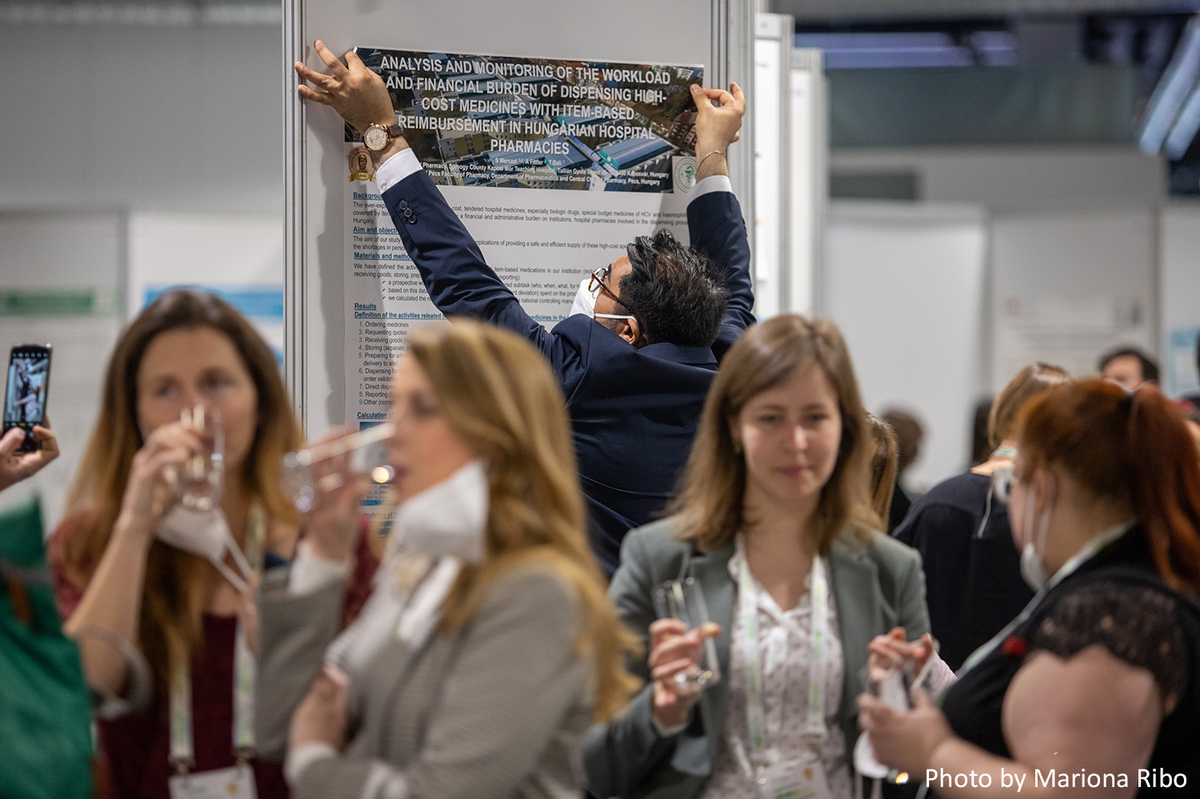
review process, provide guidance to those submitting abstracts for the first time and list tips on avoiding abstract rejection. Submissions of abstracts from all disciplines of hospital pharmacy or related areas are encouraged, provided that they can be linked to one of the 44 European Statements of Hospital Pharmacy. Questions concerning the abstract submission process can be addressed to abstract[at]eahp[dot]eu.
Also, the registration to EAHP’s 27th Congress has opened. Those interested in learning more about the latest advances in the profession and networking with international colleagues are invited to Lisbon, Portugal from the 22nd to the 24th of March 2023.Those registering before the end of November will be able to benefit from the early bird discount.
Register for EAHP’s 27th Congress HERE
Learn more about the abstract submission process HERE
Follow us on Twitter, Facebook, Instagram, and LinkedIn to stay up-to-date with the latest news from #EAHP2023
EAHP's Scientific Committee is looking for two new members
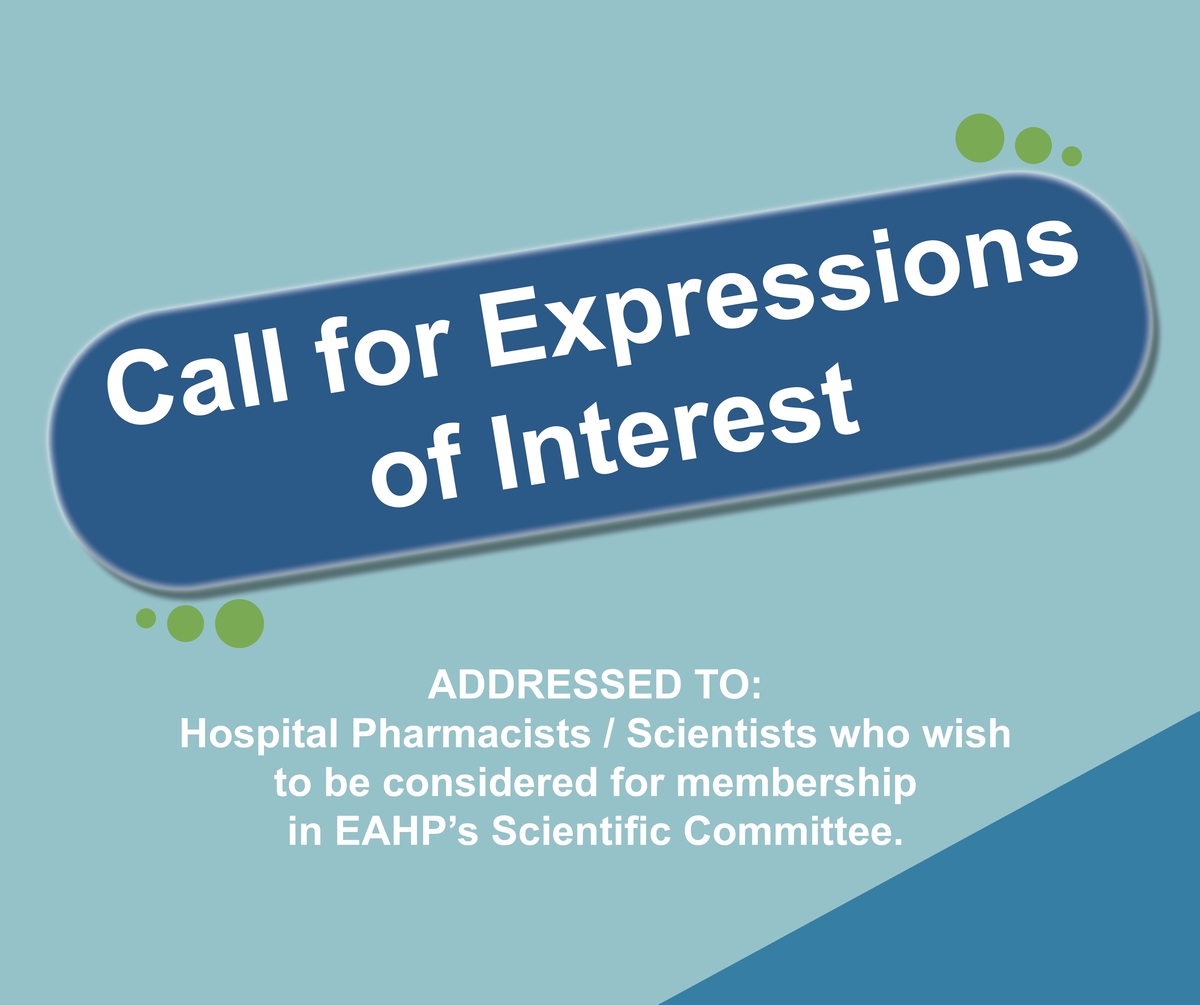 EAHP has launched a call for the expression of interest addressed to all hospital pharmacists and scientists who wish to be considered for membership in EAHP's Scientific Committee. This call for expressions of interest closes on 10 October 2022.
EAHP has launched a call for the expression of interest addressed to all hospital pharmacists and scientists who wish to be considered for membership in EAHP's Scientific Committee. This call for expressions of interest closes on 10 October 2022.
EAHP is committed to providing educational innovation and training of hospital pharmacists to a level of specialisation and maintain continuing professional development (CPD). EAHP will facilitate and enhance the professional growth of European hospital pharmacists and develop hospital pharmacy in order to promote the best and safest use of medicines and medical devices for the benefit of patients in Europe.
Members of the Scientific Committee strive to
- To identify the educational needs of EAHP members and prepare educational programmes to meet those needs
- To provide knowledge and application based educational programmes to assist pharmacists who practice in hospitals meet their patient care responsibilities and expand their professional roles and goals.
- To share best practice, innovation and educational programmes that can be applied to daily practice
- To promote hospital pharmacy practice research
More information on the responsibilities of the Scientific Committee, the selection criteria and the application process are available on EAHP's website.
Access the call for the expression of interest HERE
EAHP General Assembly updates position paper on clinical trials
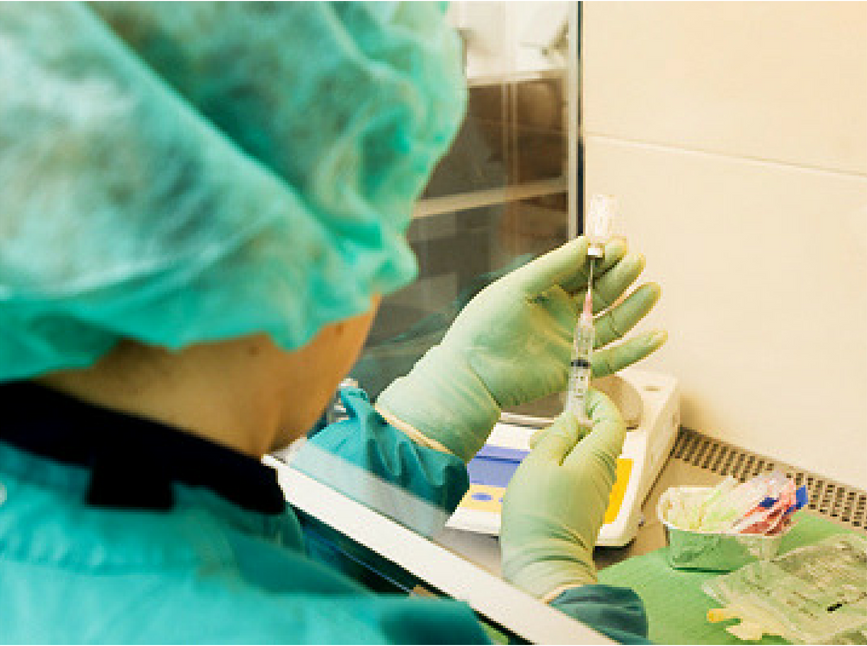 Clinical trials are essential for continuously improving patient outcomes and their quality of life. Hospital pharmacists, as members of the multidisciplinary team, are needed to safely manage them. With the entry into application of the Clinical Trial Regulation, EAHP decided to update its Position Paper on Clinical Trials in 2022.
Clinical trials are essential for continuously improving patient outcomes and their quality of life. Hospital pharmacists, as members of the multidisciplinary team, are needed to safely manage them. With the entry into application of the Clinical Trial Regulation, EAHP decided to update its Position Paper on Clinical Trials in 2022.
One of the key contributions of the pharmacist is the promotion of patient safety by collaborating in the development of a research protocol, reviewing as a member of an advisory committee, establishing mechanisms that contribute to safety, and assuring compliance with local and national regulations and standards. Hospital pharmacists are at the forefront of patient care and consequently also have a significant impact on patient management and thus should be further integrated into the work of ethics committees.
The position paper of EAHP touches on the role of hospital pharmacists in clinical trials, the involvement of different patient groups, the improvements in Europe's clinical trial landscape and the role of ethics committees in clinical trials. It contains several calls to action, namely
- EAHP calls on national governments to recognise the important roles that hospital pharmacists play in clinical trials by requiring their involvement to increase patient safety
- EAHP encourages regulators to further improve training on clinical trials by anchoring it into both undergraduate and continuing education of pharmacists.
- EAHP recognises that not all patient groups are suitable candidates or fully represented in clinical trials. Where appropriate, efforts should be made – taking into account also all relevant constraints – to create clinical trials that also study the effects of new treatment options in diverse patient populations, so that also these groups could be provided with access to new medicines once approved.
- EAHP underlines the importance of utilising the full potential of the EU Clinical Trial Regulation by swiftly putting all necessary measures in place at the national level to successfully transition to this new regime.
- EAHP urges the Member States to ensure that the role of ethics committees under the new Clinical Trial Regulation remains strong in the interest of clinical trial participants.
Read EAHP's Position Paper on Clinical Trials HERE
Further increasing safety for healthcare professionals – EAHP’s new position on hazardous medicinal products
Hazardous medicinal products are vital for the treatment of both cancerous and other non-cancerous diseases. Hospital pharmacists are responsible for the preparation of these medicinal products and like all healthcare professionals that handle and administer hazardous medicinal products are exposed to certain risks. To showcase their vital contributions, EAHP’s General Assembly adopted a new Position Paper on Hazardous Medicinal 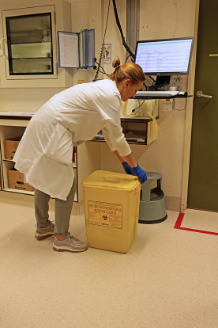 Products.
Products.
The Position Paper provides vital insights into the role that hospital pharmacists play in handling hazardous medicinal products and the protection of healthcare workers, shares best practices gathered by EAHP’s Special Interest Group (SIG) on the classification of hazardous medicinal products and touches on training and education aspects in relation to hazardous medicinal products. Since the safe handling of hazardous medicinal products is of uttermost importance for the safety of healthcare workers and patients treated with these medicines, EAHP
- calls on the European Commission and national governments across Europe to actively engage with hospital pharmacist representatives in the review of relevant Directives for the management of hazardous medicinal products in the healthcare environment.
- asks national governments and health system managers to immediately engage with the European Statements of Hospital Pharmacy and implement best practices relating to hazardous medicinal products.
- recommends an EU wide standard approach to the classification and management of hazardous medicinal products.
- advises the European Commission and national governments across Europe to initiate best practice sharing on the classification and handling of hazardous medicinal products among its Member States.
- advocates for the revision of pharmacy curricula and the expansion of training opportunities for the pharmacy workforce to account for the growing demand for the management of hazardous medicinal products and related health and safety issues.
Access EAHP’s Position Paper on Hazardous Medicinal Products HERE
Student Science Award – it’s time to start preparing
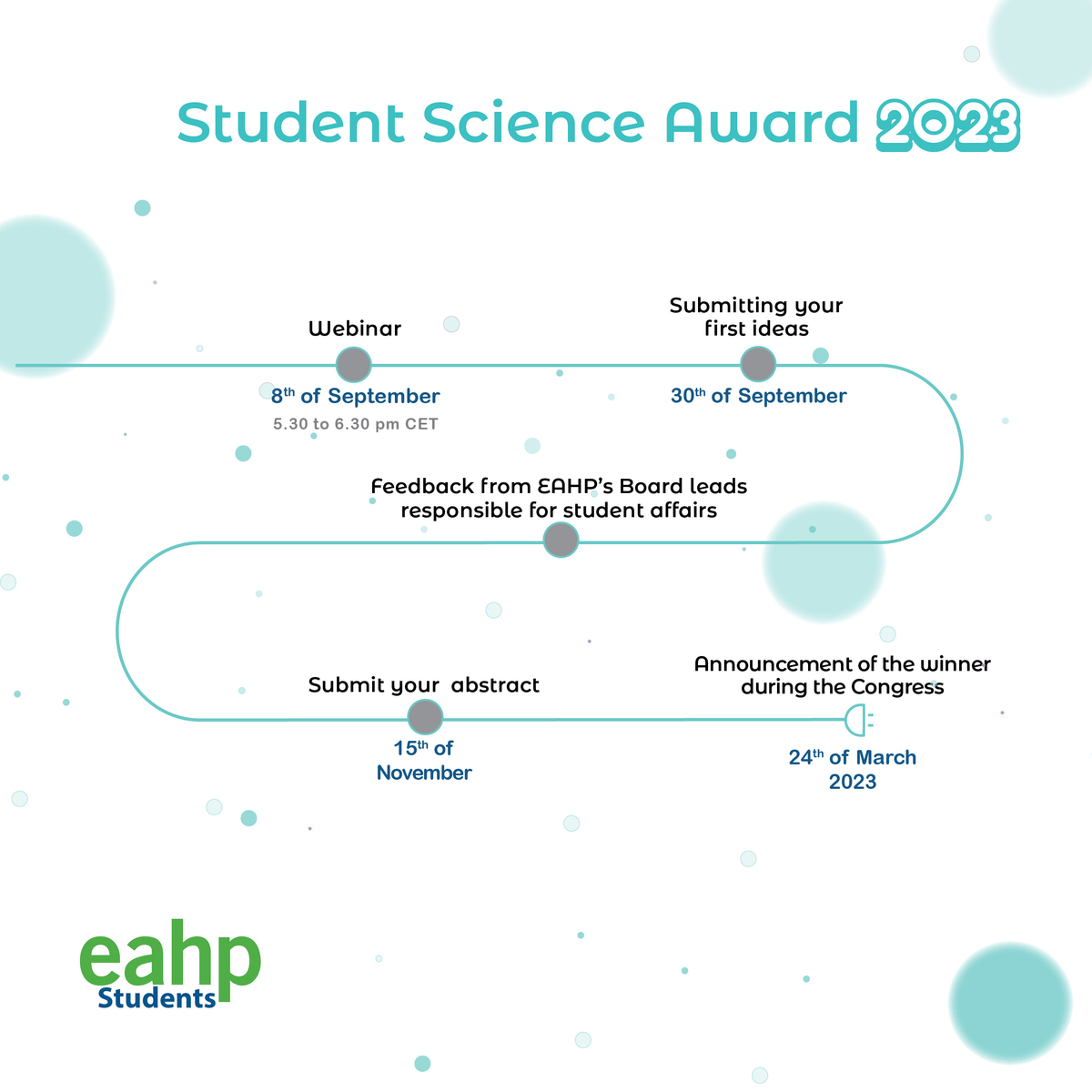 Did you miss the webinar that EAHP organised last week about the 2023 edition of the Student Science Award? Don’t worry, there is still time to participate. Abstract submission for the Student Science Award closes on the 15th of November.
Did you miss the webinar that EAHP organised last week about the 2023 edition of the Student Science Award? Don’t worry, there is still time to participate. Abstract submission for the Student Science Award closes on the 15th of November.
Until the end of September, participating students and recent graduates can obtain detailed feedback on their ideas prior to submitting their final abstract by mid-November. The abstracts that enter the Student Science Award competition are reviewed in accordance with the criteria of innovation, originality, and contribution to the development of hospital pharmacy. The author of the winning abstract will receive a complimentary registration to the 27th Congress of EAHP, including the coverage of travel and accommodation expenses (up to 500 Euros), as well as official recognition at the EAHP Congress closing ceremony on the 24th of March 2023.
Interested in travelling to Lisbon, Portugal? Don’t wait too long to start working on your abstract for the Student Science Award!
More information about the EAHP-EPSA Student Science Award HERE
Survey | Pregnancy-adjusted doses: what should a pregnancy formulary look like?
 Project MADAM (Model-Adjusted Doses for All Mothers) has launched a survey that aims to explore whether healthcare practitioners are willing to follow dose recommendations that are primarily based on model predictions and to ensure that the envisioned pregnancy formulary meets their needs. Healthcare professionals are invited to participate in this survey.
Project MADAM (Model-Adjusted Doses for All Mothers) has launched a survey that aims to explore whether healthcare practitioners are willing to follow dose recommendations that are primarily based on model predictions and to ensure that the envisioned pregnancy formulary meets their needs. Healthcare professionals are invited to participate in this survey.
Most women use medication at least once during their pregnancy. Because of physiological changes in women's bodies as part of pregnancy, the pharmacokinetics (the absorption, distribution, metabolism and elimination) of medications can be altered during that time. In some cases, this may justify changes in the medication dose that is received during pregnancy. However, because pregnant women are often excluded from clinical studies, evidence-based dose recommendations in pregnancy are missing.
Project MADAM is a collaboration between Radboud and Maastricht University Medical Centres and the Dutch Teratology Information Service (Lareb) with funding from the Gates Foundation. Our goal is to investigate how a new kind of evidence can be used to make dose recommendations for pregnant women. Pharmacokinetic models, that is, computer models that integrate the physiological changes in women's bodies and information on fetal development, are used to determine optimal dose regimens in pregnancy. Model predictions are examined by an editorial board of experts alongside other kinds of evidence on the safety and effectiveness of the medication. Pregnancy-adjusted dose recommendations can then be issued. We intend to build an international pregnancy formulary using this approach.
The survey is anonymous and last approximately ten minutes. You will be presented with different statements for which you can indicate if you agree or disagree. Important themes include your current practices and information needs with regards to medication in pregnancy. The use of computer models as evidence for medication dosing in pregnancy will be explained.
Access the survey HERE
Medical Device Coordination Group shares actions supporting the availability of medical devices
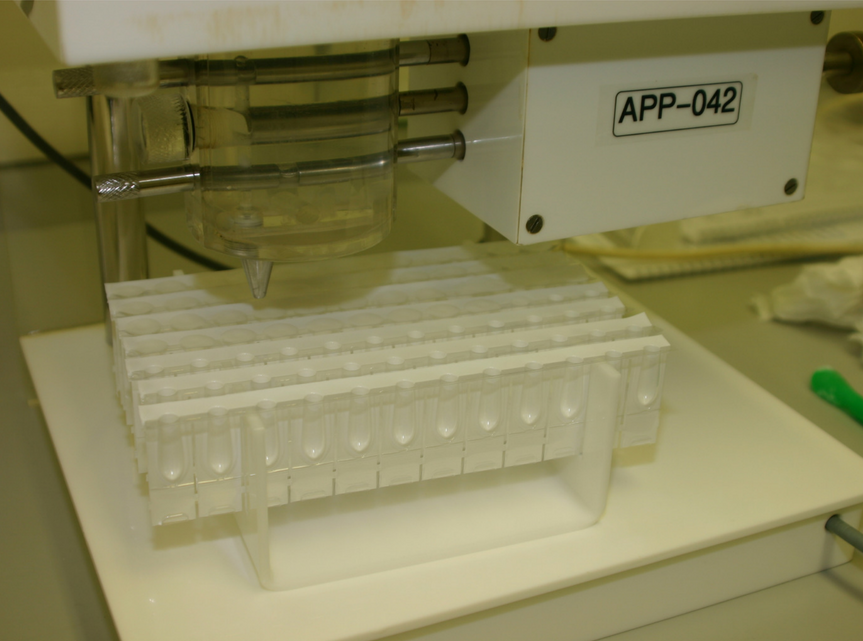 Following concerns raised on notified body capacity and availability of medical devices and in vitro diagnostics by health ministers at the Employment, Social Policy, Health and Consumer Affairs (EPSCO) Council meeting in June, the Medical Device Coordination Group (MDCG) endorsed and published a list of actions. The list of actions contained in the MDCG 2022-14 Position Paper seeks to increase the capacity of notified bodies and the preparedness of manufacturers, in an effort to facilitate the transition to the Medical Devices Regulation (MDR) and the In Vitro Diagnostic Medical Devices Regulation (IVDR).
Following concerns raised on notified body capacity and availability of medical devices and in vitro diagnostics by health ministers at the Employment, Social Policy, Health and Consumer Affairs (EPSCO) Council meeting in June, the Medical Device Coordination Group (MDCG) endorsed and published a list of actions. The list of actions contained in the MDCG 2022-14 Position Paper seeks to increase the capacity of notified bodies and the preparedness of manufacturers, in an effort to facilitate the transition to the Medical Devices Regulation (MDR) and the In Vitro Diagnostic Medical Devices Regulation (IVDR).
The MDCG position paper can be accessed HERE
Expand your knowledge in the field of critical care pharmacy
 The response to the COVID-19 pandemic and the strain it put on critical care services internationally have highlighted the importance of having a competent and trained critical care clinical pharmacy workforce. The University College Hospital Critical Care Pharmacy Team offers a one year international course in critical care pharmacy, now in its 3rd year, called ‘The Fundamentals of Critical Care Clinical Pharmacy’.
The response to the COVID-19 pandemic and the strain it put on critical care services internationally have highlighted the importance of having a competent and trained critical care clinical pharmacy workforce. The University College Hospital Critical Care Pharmacy Team offers a one year international course in critical care pharmacy, now in its 3rd year, called ‘The Fundamentals of Critical Care Clinical Pharmacy’.
It comprises of 12 monthly sessions on ICU themes, with recorded lectures and live interactive seminars, targeted reading and tasks to complete at one’s base unit. The cost is £300 for pharmacists and £150 for pharmacy technicians. A certificate of attendance or competence is offered, the latter based on local sign-off on completion of tasks/reviews.
The course is intended to:
- Upskill pharmacists who are new to critical care
- Pharmacists covering critical care on weekends/oncall/surge
- Pharmacists in other specialist areas, interested in learning more about critical care
- Pharmacy technicians currently working within critical care.
Further details can be found on the website, including how to enrol. The closing date for enrolment is 30th November 2022.
Learn more about the course HERE
The EJHP September issue is available!
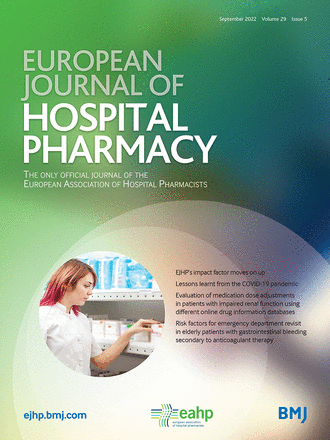
The September issue of the European Journal of Hospital Pharmacy (EJHP) is out and with it, the news that the journal’s impact factor is moving up is being discussed in the editorial. In addition, readers can learn moreabout EAHP’s survey on the future crisis preparedness of hospital pharmacies and read all about the EU and the EAHP news. Besides short reports and case reports also several original research articles are included. These are looking at for instance the burden of enteral supplement interactions with common antimicrobial agents, the development and validation of a ready-to-use score to prioritise medication reconciliation at patient admission in an orthopaedic and trauma department, science- and risk-based strategy to qualify prefillable autoclavable syringes as primary packaging material and the effectiveness of digital communication within the National Medication Safety Network for England.
Access the EJHP September issue HERE

Have you considered updating your SAT?
The implementation of the European Statements of Hospital Pharmacy is supported by the self-assessment tool (SAT) that helps pharmacies across Europe to understand the level of Statement implementation. To make the most out of the implementation plan feature, hospital pharmacies should regularly update their SAT. Talk to your chief pharmacist and encourage him/her to do an update. Different language versions (Czech, English, French, German, Greek, Hungarian, Italian, Polish, Portuguese, Romanian, Serbo-Croatian, Spanish and Turkish) are available to facilitate the process. Learn more about SAT HERE




